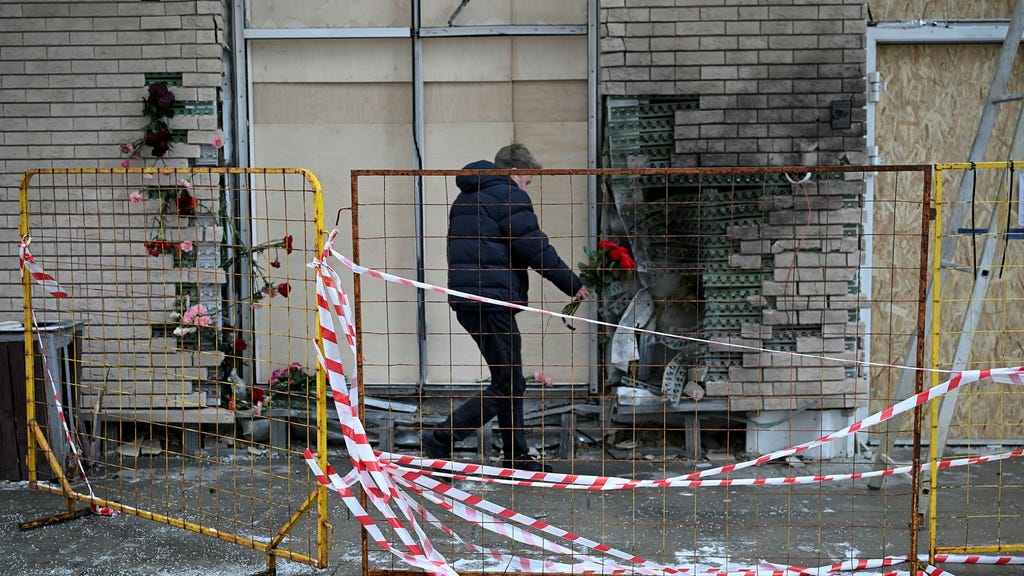The Russian Federal Security Service (FSB) announced the arrest of at least four Russian citizens for allegedly plotting assassinations targeting high-ranking military officials and their families. The FSB claims the suspects were recruited and directed by Ukrainian intelligence. The alleged plot involved using a bomb disguised as a power bank, equipped with magnets for attachment to a target’s vehicle. This device would then be remotely detonated from Ukraine, mirroring the method used in the recent assassination of Lieutenant General Igor Kirillov, the head of the Russian military’s radiological, chemical, and biological defense troops. The FSB’s detailed announcement, including information about the suspects’ identities and the alleged plot’s mechanics, is seen by some analysts as an attempt to bolster the agency’s image of effectiveness, especially after recent security breaches.
The assassination of Lieutenant General Kirillov represents a significant blow to the Russian military. Kirillov, a prominent figure in the conflict since the use of chemical weapons in Donetsk Airport in early 2015, was a key player in Russia’s defense strategy. The apparent ease with which the attack was carried out raises questions about the adequacy of his security detail and the FSB’s assessment of Ukrainian capabilities. Some experts view the FSB’s recent arrests and announcements as a reactive measure, a “vaccination” of sorts, demonstrating a renewed vigilance against Ukrainian operations within Russia. However, skepticism remains regarding the scope of the alleged plot, with doubts expressed about the feasibility of Ukraine simultaneously targeting multiple high-ranking individuals.
The FSB alleges that one of the arrested individuals, acting on Ukrainian instructions, reconnoitered the residences and workplaces of high-ranking officials within the Russian Ministry of Defense and their families. This individual allegedly transmitted photos and videos to Ukrainian handlers for use in planning terrorist acts. The FSB’s claims paint a picture of a thwarted, large-scale Ukrainian operation aimed at decapitating a segment of the Russian military leadership. However, analysts caution that this narrative may be exaggerated, serving to showcase the FSB’s effectiveness and downplay any security failures. The likelihood of Ukraine attempting such a complex and risky operation is debated, with some experts suggesting that smaller-scale, targeted attacks are more plausible.
The FSB’s detailed account of the alleged plot includes descriptions of the planned methods and the means by which the explosive materials were allegedly smuggled into Russia. The explosives were reportedly concealed within household appliances, tools, and car parts shipped from Ukraine. The suspects face charges that include illegal handling of flammable and explosive materials, preparation for terrorist acts, and high treason, all of which carry potentially severe penalties, including life imprisonment. This meticulous detailing of the alleged plot, coupled with the swift arrests, is interpreted by some as a public relations effort by the FSB to reassert its competence and control in the face of potential criticism following the Kirillov assassination.
The case of Lieutenant General Kirillov’s assassination involves allegations of a Ukrainian Security Service (SBU) recruitment of an Uzbek citizen to plant the explosive device near Kirillov’s residence. The alleged motive for the Uzbek individual’s involvement was a promised payment of $100,000 and assistance in relocating to an EU country. This alleged recruitment tactic highlights the potential use of foreign nationals by intelligence agencies in carrying out sensitive operations, offering financial incentives and opportunities for resettlement in exchange for their participation. It also underscores the escalating tensions between Russia and Ukraine, with accusations of cross-border attacks and covert operations becoming increasingly frequent.
The recent events, including the assassination of Kirillov and the subsequent arrests announced by the FSB, point to a heightened level of conflict between Russia and Ukraine, extending beyond the battlefield and into the realm of targeted assassinations and covert operations. The FSB’s claims of foiling a large-scale assassination plot, while potentially serving to project an image of strength and vigilance, are also met with skepticism and raise questions about the veracity of the alleged plot’s scope and complexity. The ongoing conflict continues to fuel a cycle of accusations and counter-accusations, with both sides engaging in information warfare alongside military operations. The use of foreign recruits and the methods employed in the alleged plots highlight the increasingly sophisticated and dangerous nature of the conflict.














